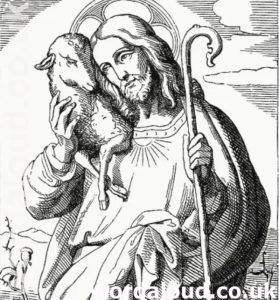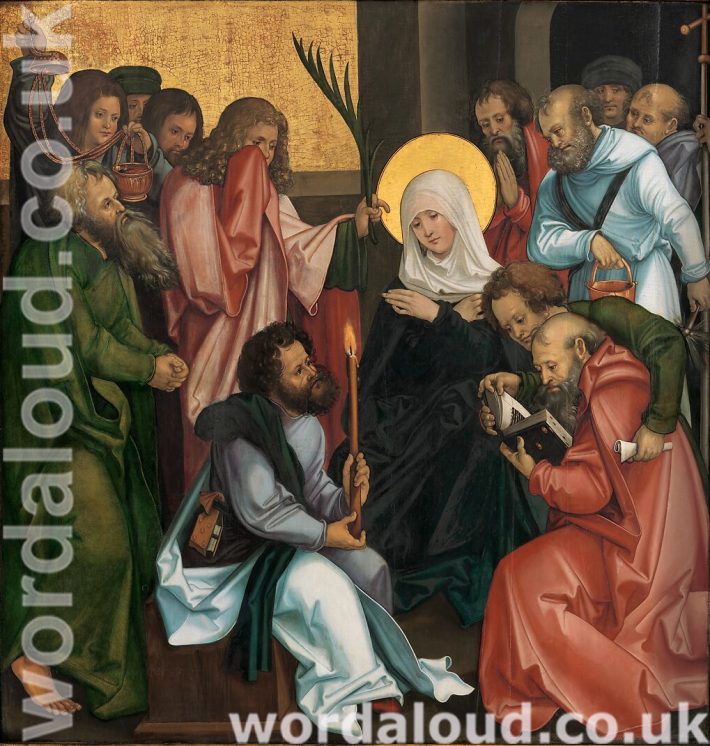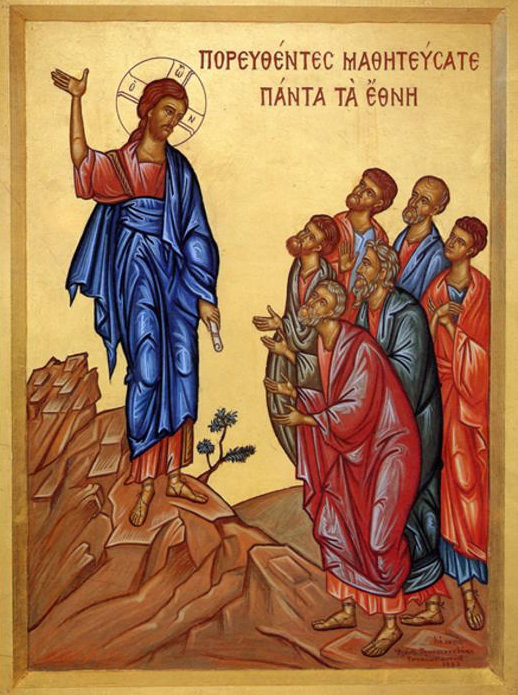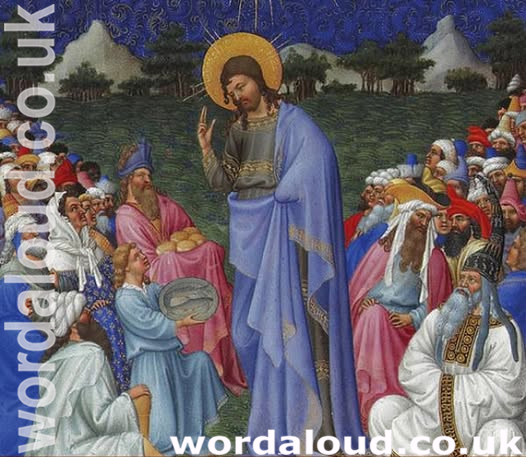Christian Art | Dormition Of The Virgin Mary | Mother Of God
Office Of Readings | Week 27, Thursday, Ordinary Time | A Reading From The Letter Of Saint Ignatius Of Antioch To The Philadelphians | One Bishop With The Presbyters And Deacons
‘One bishop with the presbyters and deacons.’
Saint Ignatius of Antioch returns to one of his central themes: the inseparable unity of the Church under one bishop, presbyters, and deacons. His appeal is both pastoral and theological, shaped by his conviction that visible unity reflects the inner unity of Christ himself. For Ignatius, the structure of the Church is not a matter of administration but an expression of divine order.
Saint Ignatius begins by greeting the community as those who have ‘found mercy’ and are ‘made believers in [Christ’s] resurrection’. Their faith, he notes, is not static but active, rooted in the passion and resurrection of the Lord. The life of the Church is thus grounded in the paschal mystery, and this shared participation in Christ’s death and new life forms the basis for communion among believers.
Ignatius speaks warmly of the bishop of Philadelphia, commending his humility, gentleness, and silence—qualities that stand in contrast to the ‘empty talkers’ who threaten unity. His description of the bishop being ‘in harmony with the commandments as is a lute with its strings’ captures Ignatius’s sense of ecclesial balance: a community held together not by force or argument, but by harmony with God’s will. The bishop’s authority is not self-made; it derives ‘neither by his own efforts, nor from men, nor even out of vainglory, but from the love of God’.
This insistence reflects a key point in Ignatius’s theology of ministry: the bishop is a sign and instrument of divine unity. To follow the bishop is to remain within the life of the Church; to separate from him is to step outside communion with Christ. For Ignatius, there is no opposition between the visible and the spiritual Church—both belong together in the same reality. Hence his strong warning: ‘If anyone follows a schismatic, he will not obtain the inheritance of God’s kingdom.’
At the heart of the letter lies a profound reflection on the Eucharist. Ignatius exhorts the faithful to ‘take part only in the one Eucharist’, for there is ‘only one flesh of our Lord Jesus Christ and one cup to unite us with his blood’. The unity of the altar mirrors the unity of the Church; the single Eucharist, presided over by the bishop, becomes the visible sign of Christ’s undivided body. To share in the same bread and cup is to belong to one communion and one faith.
This understanding is both pastoral and polemical. The early Christian communities faced divisions not only over doctrine but also over rival celebrations of the Eucharist, often led by unauthorised teachers. Ignatius’s insistence on the ‘one altar’ safeguards both orthodoxy and charity. The Eucharist cannot be separated from right belief or from legitimate ecclesial authority; both express the same truth, the real presence of Christ in his people.
Toward the end of the letter, Ignatius’s tone becomes more personal. Though ‘imprisoned for his sake’, he confesses his own sense of inadequacy and dependence on the prayers of others: ‘I fear more because of my imperfection.’ His humility underlines the mutual dependence of all within the Church. Even an apostolic bishop and martyr relies on the intercession of his brothers and sisters. His words reveal not only his doctrine of unity but also the depth of his humanity: a faith strengthened not in isolation, but through communion.
Ignatius places his trust in ‘the person of Christ through the Gospels’ and in ‘the true ministry of the Church through the apostles’. In this confession, the whole vision of his letters is drawn together. The unity of the Church, the authority of the bishop, the truth of the Eucharist, and the reality of the apostolic faith all converge in Christ himself. For Ignatius, to belong to the one Church is to share in the one life of Christ: his body, his blood, his suffering, and his glory.

A Reading From The Letter Of Saint Ignatius Of Antioch To The Philadelphians | One Bishop With The Presbyters And Deacons
Ignatius, also called Theophorus, to the church of God the Father and the Lord Jesus Christ located at Philadelphia in the province of Asia. You have found mercy and have been strengthened in the peace of God; you are now filled with gladness because of the passion of our Lord, and by his mercy you are made believers in his resurrection. I greet you in the blood of Jesus Christ. You are my abiding and unshakable joy, especially if your members remain united with the bishop and with his presbyters and deacons, all appointed in accordance with the mind of Christ who by his own will has strengthened them in the firmness which the Spirit gives.
I know that this bishop has obtained his ministry, which serves the community, neither by his own efforts, nor from men nor even out of vainglory, but from the love of God the Father and of the Lord Jesus Christ. I am deeply impressed by his gentleness, and by his silence he is more effective than the empty talkers. He is in harmony with the commandments as is a lute with its strings. I call him blessed, then, for his sentiments toward God, since I know these to be virtuous and perfect, and for his stability and calm, in which he imitates the gentleness of the living God.
As sons of the light of truth, flee divisions and evil doctrines; where your shepherd is, follow him as his flock.
For all who belong to God and Jesus Christ are with the bishop; all who repent and return to the unity of the Church will also belong to God, that they may live according to Jesus Christ. Do not be deceived, my brothers. If anyone follows a schismatic, he will not obtain the inheritance of God’s kingdom; if anyone lives by an alien teaching, he does not assent to the passion of the Lord.
Be careful, therefore, to take part only in the one Eucharist; for there is only one flesh of our Lord Jesus Christ and one cup to unite us with his blood, one altar and one bishop with the presbyters and deacons, who are his fellow servants. Then, whatever you do, you will do according to God.
My brothers, I overflow with love for you and with a joyous heart I make you strong – although it is not so much I but Jesus Christ. Although imprisoned for his sake, I fear more because of my imperfection. But your prayers will perfect me in the eyes of God so that I might yet receive the inheritance promised me by the merciful God. I seek refuge in the person of Christ through the Gospels and I appeal to the true ministry of the Church through the apostles.
Christian Prayer With Jesus Christ
Lord Jesus Christ,
you gather your Church into one body,
fed by your word and nourished by your sacrament.
Grant that we may remain steadfast in unity of faith and love,
obedient to those who serve in your name,
and faithful to the teaching handed down from your apostles.
Keep us from division and falsehood,
and make us one in heart, mind, and worship,
as there is one Eucharist, one altar, one bishop,
and one Lord, who lives and reigns for ever and ever.
Amen.
Glossary Of Christian Terms
Saint Ignatius of Antioch (c. 35–107) – Early Christian bishop and martyr. His letters, written en route to Rome, form an important witness to early Christian theology, particularly the unity and structure of the Church.
Philadelphia – An early Christian community in Asia Minor (modern Alaşehir, Turkey), one of the seven churches addressed in the Book of Revelation.
Bishop, Presbyters, and Deacons – The threefold structure of ordained ministry described by Ignatius. The bishop represents Christ; the presbyters (priests) assist him; the deacons serve the Church’s needs and embody its ministry of service.
Empty talkers – Those who spread false or divisive teaching without the authority of the Church.
‘One Eucharist… one altar… one bishop’ – Ignatius’s expression of the unity of the Church in its worship and leadership. The single Eucharist symbolises the one body of Christ; multiple rival celebrations indicate division.
Schism – The act of breaking communion with the Church or with legitimate ecclesial authority. Ignatius views schism as a denial of the unity of Christ’s body.
Eucharist – The sacrament of Christ’s body and blood, the centre of Christian worship and the visible sign of unity among believers.
Apostolic teaching – The authentic faith and practice of the apostles, transmitted through the Church’s ministry and safeguarded by its hierarchy.
‘In harmony with the commandments as is a lute with its strings’ – A metaphor describing the bishop’s spiritual alignment with God’s will, ensuring harmony within the Church as a whole.








